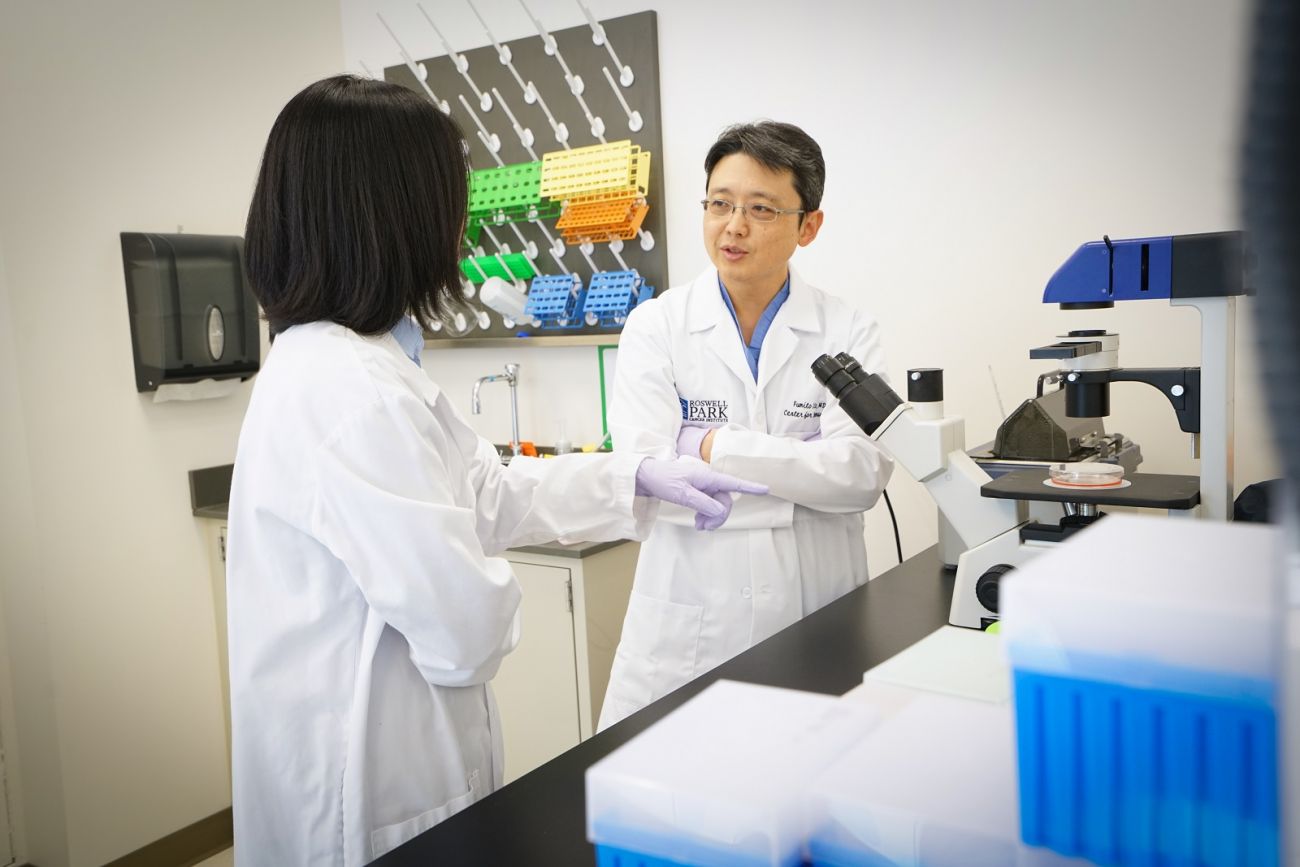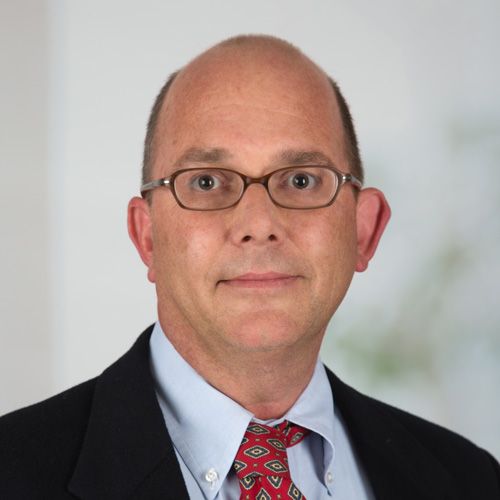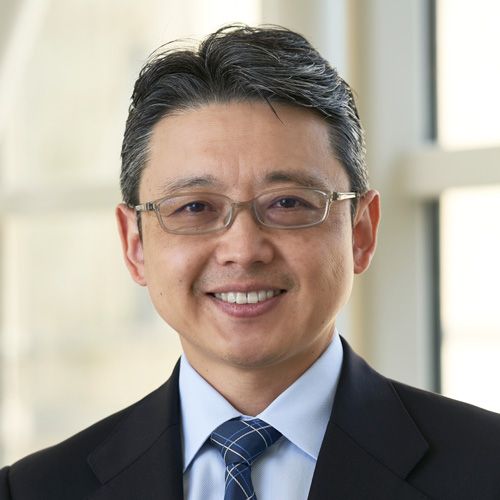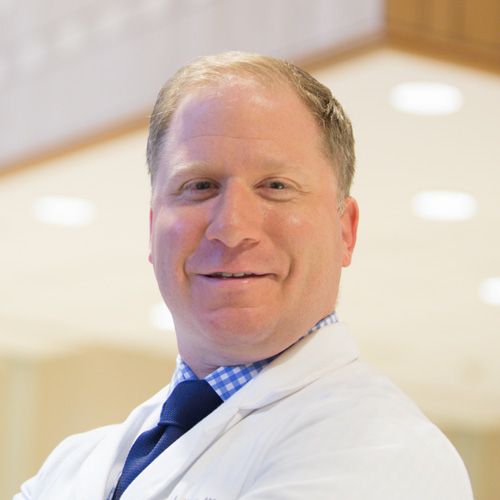Recent publications present new findings in melanoma as well as pancreatic, prostate and rectal cancers
- One study looks to prevent sarcopenia, fat gain after ADT for prostate cancer
- Findings in melanoma, rectal cancer studies may help guide treatment decisions
- New drug target, possible treatment strategy uncovered in pancreatic cancer
BUFFALO, N.Y. — Four recent published studies highlight important research by Roswell Park Comprehensive Cancer Center scientists in several types of cancers. They range from new insights on effective treatment decision-making for patients with rectal cancer to new strategies for improving outcomes or reducing side effects for patients with prostate cancer, pancreatic cancer and melanoma.
Strategy for Preventing Some Side Effects of ADT
Kent Nastiuk, PhD, Assistant Professor in the Departments of Cancer Genetics & Genomics and Urology, was senior author of a study published in JCI Insight on preventing androgen-deprivation therapy (ADT) from causing sarcopenia — the loss of muscle mass and strength — and fat gain in patients with prostate cancer.
While there is no intervention to overcome this “obese frailty syndrome” side effect brought on by low testosterone, the team found that feedback between tumor signaling proteins and muscle tissue — a dynamic known as an endocrine loop — accelerates the condition.
“From our preclinical experiments, we concluded that blocking a particular hormone, growth differentiation factor 11, or GDF-11, in combination with androgen-deprivation therapy may be sufficient to prevent strength loss but still control prostate cancer,” Dr. Nastiuk says.
Clinical trials are underway at Roswell Park to pursue the implications of this work, and could lead to new therapies to reduce these side effects of prostate cancer treatment.
Insights on Why Melanomas Respond Differently to Immunotherapy
Fumito Ito, MD, PhD, FACS, Associate Professor of Surgical Oncology and a member of the Center for Immunotherapy, led other work published in JCI Insight — a study elucidating the heterogeneity of T cells in melanoma.
The study, supported by donations to Roswell Park, looked at how T lymphocytes, or while blood cells, that attack and target the same tumor antigen will express different molecules on their surfaces, and act differently against tumors.
“Although tumor-specific T lymphocytes recognize the same antigen,” Dr. Ito says, “they expressed various levels of a particular chemokine receptor, CX3CR1, and played different roles against melanoma in the tumor microenvironment.”
Importantly, the team found that T cells with varying levels of CX3CR1 responded differently to immunotherapy with checkpoint inhibitors.
“Cancer immunotherapies that target the T-cell immune checkpoints, such as CTLA-4, PD-1 and PD-L1, have shown unprecedented success for the treatment of a variety of malignancies; however, how this works on T cells within the tumor remains unclear,” Dr. Ito says. “We believe this work addresses gaps in our knowledge of the heterogeneity of T lymphocytes in melanoma, yields insights into the mechanisms of action of immune checkpoint inhibitors and provides a solid foundation for the future development of personalized cancer treatment.”
The results from this study may also be applicable for other cancers.
Biopsy Results A Reliable Indicator in Rectal Cancer
Steven Nurkin, MD, Associate Professor in the Department of Surgical Oncology, is senior author of a study on the use of neoadjuvant therapy in rectal cancer and how response in the pathologic specimen correlates with improved cancer outcomes.
Pathologic response is an important tool for assessing whether chemotherapy and/or radiation have been effective. But it’s not always clear whether pathologic complete response — evidence that there is no cancer present in tissue samples removed through surgery or biopsy after treatment has been administered — is a reliable enough factor on its own to guide treatment decision-making.
“This study shows that pathologic complete response is an independent predictor and one of the most important factors associated with overall survival, regardless of how many lymph nodes have been analyzed,” Dr. Nurkin says. “Our findings prove that biology is king, and that optimizing neoadjuvant strategies in the setting of multidisciplinary care will likely be the key to improved survival for patients with locally advanced rectal cancer.”
The study is available online, and will be published in the July print edition of the Journal of Surgical Research.
Study Opens Doors for New Approach in Pancreatic Cancer
Prasenjit Dey, PhD, Assistant Professor in the Department of Immunology, led a team of scientists from Roswell Park and MD Anderson Cancer Center that explored metabolic reprogramming in pancreatic cancer cells.
Clinicians have treated various solid tumors by targeting T cells using an immunotherapy approach known as checkpoint blockade, even in some hard-to-treat cancers. But pancreatic cancer tumors contain immunosuppressive cells that inhibit the effectiveness of this treatment method, according to Dr. Dey, who began the study while on staff at MD Anderson.
The team’s study, published in Cancer Discovery, a journal published by the American Association for Cancer Research, is the first to identify immune cell-derived cytokines that act directly on cancer cells, helping drive tumor metabolism, and also identified the IL4R receptor as a novel therapeutic target in pancreatic cancer.
“We showed that a subtype of T cells are immunosuppressive and actively support tumor growth,” Dr. Dey says. “Our study shows that inhibiting cytokine pathways slows pancreatic cancer growth and increases survival in a preclinical model. The identified cytokine, its receptor and the downstream signaling can all be potentially targeted using available drugs.”
###
Roswell Park Comprehensive Cancer Center is a community united by the drive to eliminate cancer’s grip on humanity by unlocking its secrets through personalized approaches and unleashing the healing power of hope. Founded by Dr. Roswell Park in 1898, it is the only National Cancer Institute-designated comprehensive cancer center in Upstate New York. Learn more at www.roswellpark.org, or contact us at 1-800-ROSWELL (1-800-767-9355) or ASKRoswell@RoswellPark.org.
Annie Deck-Miller, Senior Media Relations Manager
716-845-8593; annie.deck-miller@roswellpark.org




